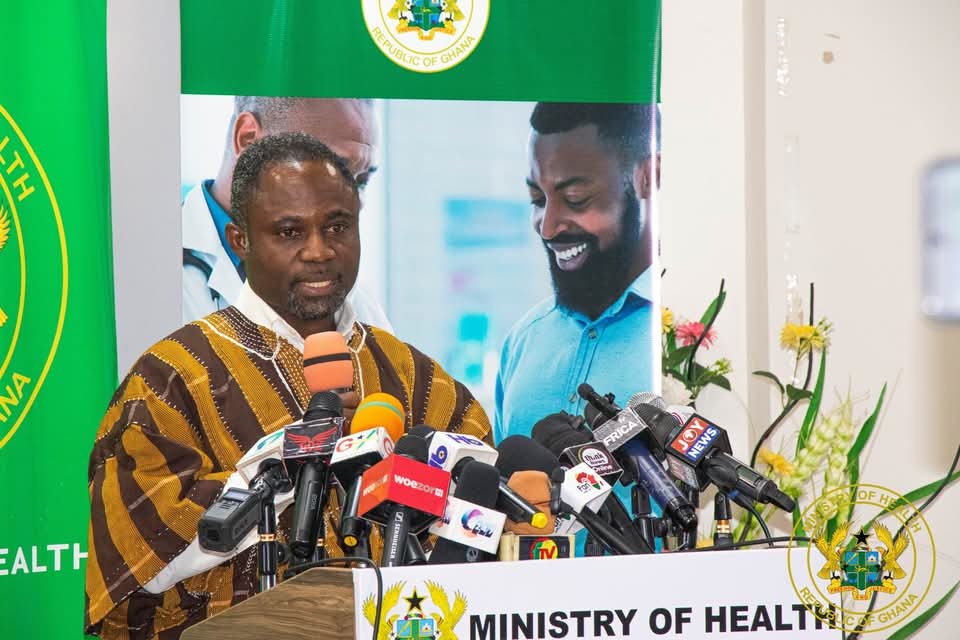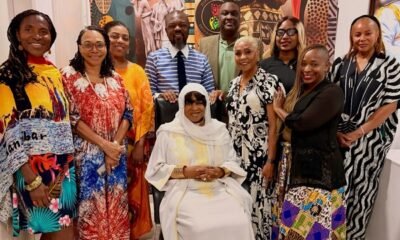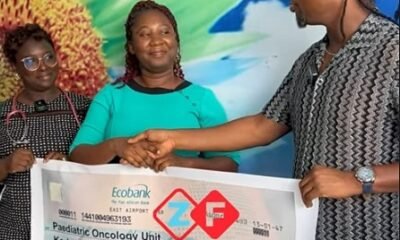News
Health minister launches Ghana Medical Cares Trust Fund Taskforce

The Minister for Health, Kwabena Mintah Akandoh, has officially inaugurated the Ghana Medical Care Trust Fund (MahamaCares) Taskforce to oversee the successful implementation of the initiative.
MahamaCares, an initiative of His Excellency President John Dramani Mahama, aims to provide dedicated financial support to individuals suffering from chronic and debilitating illnesses.
The initiative is designed to ensure fairness in healthcare access, particularly for those facing financial barriers to treatment.

Addressing the gathering, Mr. Akandoh highlighted that while the National Health Insurance Scheme (NHIS) has improved medical coverage, it does not completely ease the financial burden of treating chronic diseases.
He stated, “The Ghana Medical Trust Fund is a bold response to this challenge. It’s purpose is clear: no Ghanaian should choose between their health and financial ruin.”
He noted that the taskforce has been tasked with developing a strong policy and legal framework to establish MahamaCares as a statutory entity.
In addition, the team will be responsible for designing a sustainable funding model to ensure the long-term viability of the fund, setting clear eligibility and disbursement criteria to guarantee fairness, and evaluating Ghana’s healthcare infrastructure to recommend improvements for better accessibility.
Rev. Prof. Emeritus Seth Aryeetey, Chairman of the nine-member taskforce, expressed his immerse gratitude to the President and the Minister for the opportunity to serve.
He assured that the taskforce would work diligently to ensure the success of the MahamaCares initiative and deliver on its mandate effectively.
Other members of the taskforce include; Prof. Emeritus Binka – former Vice Chancellor of the University of Health and Allied Sciences, Prof. Margaret Kweku – Public Health Consultant, Dr Alfred Doku – Consultant Cardiologist, Dr. Radolph Nsor-Ambala – financial expert, Dr Anthony Gingong – representative of the National Health Insurance Trust Fund, Dr. Anthony Seddoh – Health Policy and financing expert, Anna Pearl Akiwumi Siriboe – lawyer and the Attorney General’s representative for the committee and Dr Belinda Afriyie – Public Health Consultant Secretary for the Taskforce.
Hot!
Diaspora Affairs Office hosts African diaspora delegation ahead of citizenship conferment

The Diaspora Affairs Office at the Office of the President has hosted a delegation of African diaspora women who are in Ghana ahead of a planned Presidential Conferment of Citizenship ceremony.
The Director of Diaspora Affairs, Kofi Okyere Darko, explained in a Facebook post that the visit was a gesture of appreciation by the delegation to the Government of Ghana for its continued efforts to reconnect Africans in the diaspora with their ancestral homeland.
He indicated that the ceremony, scheduled for next Monday, will officially grant Ghanaian citizenship to members of the delegation as part of the country’s broader engagement with the African diaspora.
The delegation was led by Erica Bennett, Founder of the Diaspora Africa Forum.
According to Mr Okyere Darko, her years of advocacy have played an important role in strengthening ties between Africa and people of African descent living abroad.
He noted that the group’s journey towards citizenship represents not only a legal process but also a cultural and spiritual return to their roots.
Also present at the meeting was Natalie Jackson, an attorney who is also expected to receive Ghanaian citizenship during the ceremony. She works closely with renowned civil rights lawyer Ben Crump.
Mr Okyere Darko emphasised that Ghana remains committed to strengthening relationships with the African diaspora and promoting unity, identity, and shared heritage among people of African descent worldwide.
By: Jacob Aggrey
News
Ghana signs debt restructuring agreement with Belgium

Ghana has signed a debt restructuring agreement with the Kingdom of Belgium as part of efforts to restore the country’s economic stability after the financial crisis that hit the nation in 2022 and 2023.
The Minister of Finance, Cassiel Ato Forson, today disclosed that he signed the agreement on behalf of the Government of Ghana.
He explained that Ghana experienced a very difficult period during the crisis, which forced the government at the time to declare a debt default.
However, he indicated that the country is now recovering and witnessing a significant economic turnaround.
According to him, stronger systems are also being put in place to ensure that Ghana does not return to such a situation again.
Dr Forson noted that the agreement with Belgium is the eighth deal Ghana has concluded with countries under the Official Creditor Committee as part of its external debt restructuring programme.
He expressed appreciation to the Government of Belgium for its support and partnership with Ghana during the process.
The Finance Minister thanked Carole van Eyll, Ambassador of Belgium to Ghana, for her role in strengthening relations between the two countries.
The agreement forms part of Ghana’s broader effort to restructure its external debts and stabilise the economy following the crisis.
By: Jacob Aggrey

 News1 week ago
News1 week agoFinance Minister outlines new gold policies to boost reserves and curb smuggling

 News1 week ago
News1 week agoSam George launches the 2026 Meteorological Awareness Month; presents the 2026 seasonal forecast for southern Ghana

 Hot!1 week ago
Hot!1 week agoBreaking: Footballer who killed two children in Abesim handed lifetime sentence














